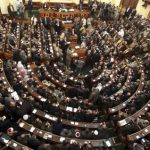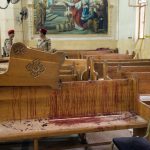By George Mikhail – Al-Monitor –
Gamaa Islamiya’s political wing publicly launched its elections last month with the consent of Egypt’s security apparatus, which raises questions about the return of the Islamist group to the political scene.
°°°
The elections conducted within the Building and Development Party, the Gamaa Islamiya’s political wing, raised questions about the return of the group to political life. Ever since the ousting of former President Mohammed Morsi on July 3, 2013, the party has been out of political life as it announced its participation in the Anti-Coup Alliance and forged an alliance with the Muslim Brotherhood against the current regime. The Building and Development Party elections began April 8 and end May 13, and will lead to the election of new secretaries across Egypt as well as new higher commission members and a new chairman.
The restructuring plan, announced April 3 by the Building and Development Party, starts with the provincial elections, to be followed by the party’s higher commission election and then the chairman election.
The party’s secretary-general, Gamal Samak, sent a letter April 17 to the party members urging them to participate in the elections. “Over the past four years, there have only been leadership positions [for show] without the holders of these positions participating in the party’s work. Meanwhile, others were weak participants. Therefore, we call upon all the party members who have the time and can make the effort to participate in the party’s work to run for leadership positions,” Samak said in the letter published on the party’s website.
The Building and Development Party’s announcement of its holding of comprehensive elections raises several questions, especially considering that these elections are openly conducted without fear from the current regime despite the fact that several Gamaa Islamiya leaders were arrested. Chief among these was the chairman of the Gamaa Islamiya Shura Council, Issam Darbala, who was detained in May 2015 on charges of inciting to violence and who died due to health problems in prison on Aug. 9, 2015. Does the public restructuring of the party reflect a prelude to its return to political life and reconciliation with the current regime?
Maher Farghali, an independent researcher on Islamist groups, told Al-Monitor, “The Gamaa Islamiya has lost its ability to mobilize and control its supporters, as it always fails to take a firm position [on the Brotherhood], and maintains an equal distance from the Muslim Brotherhood and the state. The absence of a firm political vision on its part has led it to lose a large segment of supporters, be they Brotherhood supporters, opponents of the current regime or just people who refuse violence.”
“The Building and Development Party’s elections are taking place in public and are not carried out against the will of the state, but [it seems] the regime knows full well that the Gamaa Islamiya is maneuvering and wants to deceive it. Therefore, the state allowed it to hold its party elections to prove that it is not in a battle against the Islamists in general and to be able to divide its enemies. Since the isolation of Morsi, contacts were ongoing between the security apparatus and some leaders of the Gamaa Islamiya, albeit with each party knowing the intention of the other,” he added.
Farghali continued, “The state will not stop the Building and Development Party from participating in the elections should it want to do so, but reconciliation can only happen when the Gamaa Islamiya declares a clear and open position rejecting the Muslim Brotherhood, expressing full bias to the state and bringing back the Reformist leaders such as Najeh Ibrahim. Ibrahim, who resigned from the Gamaa Islamiya in March 2011 due to disputes within the group, oversaw the ideological revisions in prisons in the 1990s that provided for the cessation of violence against the state under the rule of former President Hosni Mubarak.”
In a statement to Al-Monitor, parliament member Mohamed Abu Hamed criticized the party’s public elections and said, “The survival of the Building and Development Party is illegal because it is a party based on religion, and [Article 74 of] the constitution prohibits religion-based parties. There are many lawsuits aimed at dissolving the party.”
The lawsuits aimed at dissolving the party include a lawsuit filed by lawyer Hamdi al-Fakhrani, who accused the party of being established on religious grounds.
He stressed that after the isolation of Morsi, Egyptian society started to refuse the participation of any party or group that communicates with the Muslim Brotherhood or fails to support the state in its war against terrorism. “The Building and Development Party serves as a cover for terrorists, and the state must not heed its attempts to return to political life,” he added.
Khaled al-Zaafrani, an independent expert on Islamist movements, told Al-Monitor, “The Gamaa Islamiya lost a lot in its alliance with the Muslim Brotherhood following the dispersals of the Rabia al-Adawiya and Nahda sit-ins. The Brotherhood leaders took advantage of the Gamaa Islamiya supporters through their participation in the pro-legitimacy coalition. The Gamaa Islamiya recently abandoned said coalition following the [June 2016] statements made by the deputy leader of the Muslim Brotherhood to the British House of Commons whereby he accused the Gamaa Islamiya of resorting to violence.”
“There is a current within the Gamaa Islamiya that wants to restructure the party, disavow the Muslim Brotherhood and return to political life. The leaders of this current know full well that the more the Gamaa Islamiya moves away from and attacks the Muslim Brotherhood, the closer it gets to the state and the bigger its opportunity is to return to political life,” he added.
The Gamaa Islamiya relationship with the current regime always raises questions about its political future and its desire to participate in political life. The Gamaa Islamiya’s conducting its elections in public and publishing all its news on its website, as opposed to working in secret, reflects the desire of the state to deal with it differently from the Muslim Brotherhood, which was classified as a terrorist group in accordance with a court ruling in February 2014.
______________________
http://www.al-monitor.com/pulse/originals/2017/05/egypt-gamaa-islamiya-return-political-brotherhood-regime.html#ixzz4gni363Xe
Translation: Sami-Joe Abboud
Photo: Abdel Akhir Hammad, spiritual leader of the formerly militant group Gamaa Islamiya, is reflected in a person’s spectacles during an interview with Reuters in Assiut, Egypt, July 13, 2013. (photo by REUTERS/Mohamed Abd El Ghany)





